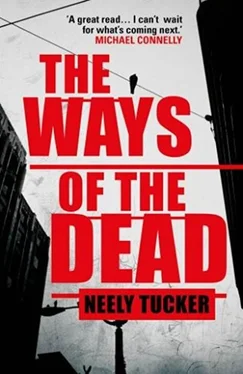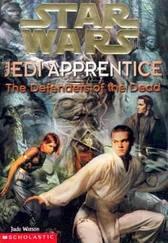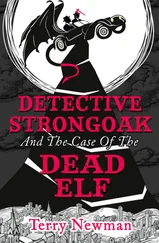Sully’s ears rang. The blood was still oozing outward on the wooden floor. It was coming over to the kitchen linoleum now.
A moment passed. Sly looked down at the body, then lightly kicked Doyle’s thigh. “I ought to get a gotdamn reward.”
Sully leaned down and put his hands on his knees, trying to get his breath. “I wasn’t thinking about that exactly.”
“No?” Sly was still looking down at Doyle.
“What-what I was thinking about was more about how he came in the-”
“Wasn’t nothing to worry about. Lionel buzzed me he was coming up the sidewalk.”
“And you let me walk upstairs?”
“You were halfway up there already. It worked out better, catching him in the hallway like that.”
“Better for who?”
Sly didn’t answer, but bent down and picked up Doyle’s gun with his gloved fingers, then reached into a pocket and pulled out his cell, punching in numbers.
Winking at Sully, speaking to Lionel, he said, as relaxed as if going for a Sunday drive, “Come on. Bring the stuff. Them gas cans, too.”
By dawn, the blaze was billowing out the first-floor windows, glass breaking with the heat, orange flames licking up the front of the house. Firefighters were shouting that the roof was caving in at the back. Fire engines, set up in the rear alley and out front on Princeton, were as much watering down the houses on either side as they were training the hoses on Doyle’s, trying to keep the flames from jumping from one roof to the next, Sully figured. That happened, the entire block would be an inferno.
He was standing on the sidewalk behind the police barricade, showered, in a fresh change of clothes. All the old clothes-shirt, pants, shoes, socks, underwear, everything-were in a dumpster in an alley halfway out to the Beltway.
The David Reese story was on the front page, dominating the early news shows, but it was quickly being engulfed by the fire and its darker revelations, the thick black cloud of smoke going straight up and then spiraling over the golf course, filtering toward downtown and the federal city.
It was visible from the Capitol building as a dark finger on the horizon, a foreboding image, and the networks and cable channels were keeping their cameras trained on it from their rooftop sets near the Capitol. Cameras could take in the host talking with the Capitol dome in the background, and then just pan to the spiraling smoke.
At the scene, uniformed officers were holding the crowd at the barricades, most of them residents who’d been evacuated from adjacent houses. Four television trucks sat at the curb, their antennae sprouting up like tiny metal hairs on the asphalt head of the city. Traffic on Warder was at a standstill, people getting out of their cars, walking up to be able to look around the corner and see the enflamed building. Boys in big, loose T-shirts, riding their bikes in circles, whooping.
A hose sent a huge stream of water toward Doyle’s, the torrent bursting into spray and steam upon contact with the roof, shooting through the windows, the hiss of it meeting flame and ember, cascades of water running off the porch. The yard was drenched, the overflow pouring off the postage-stamp yard, over the low stone wall to the sidewalk, where it splattered and ran into the street.
Sully was steadily dictating to Tony, the man still on from the overnight shift, updating the story on the fly for the paper’s nascent Web site.
“‘The interior of Goodwin’s home appeared to be austere and grim, with some sort of death chamber’-call it a ‘ macabre ,’ Tony, ‘ macabre ,’ death chamber-‘in the basement. A hurried view of the premises this morning, just as the fire was breaking out, showed an upstairs bedroom with almost no furnishings other than a mattress on the floor and a tidily kept office.
“‘The basement was decorated with grisly displays-pictures, mementos, items of clothing-of several dead women, their photographs in both life and death. The packed-dirt floor appeared to be a burial pit, partially obscured by floorboards and carpet. Recently turned earth showed the remains of what appeared to be human skeletal remains.’”
“Jesus.”
“I know, right?”
“How the hell did you get in there?”
“Luck and nerve.”
“What does that mean?”
“It means I was over here early and, Christ, there was fire coming out of the front window. Knew it was his place, ran up. Door was open. Went in to look for him.”
“And found this.”
“And found this.”
“Was he in there?”
Sully paused, thinking.
“Not that I saw.”
“And you’re sure? I mean, you are fucking-A sure about the basement? The corpse?”
“I don’t know how many times I can say it.”
“Okay. I’m still going to couch it as it ‘appeared’ to be a body, ‘appeared’ to be this and that down there. Now. They’re beating on me for an update. Gimme something on the scene outside.”
“A couple hundred people, I’d say, top and bottom of the street. Two fire engines out here now. Looks to be just the one house going up. Tall, tall plume of smoke. Very black. Is Photo over here yet? And hey-so what is Chris getting from the cops about Doyle’s location?”
“They think maybe he’s inside.”
“Yeah, well, he’s a crispy critter if so. I’m sweating and I’m at the back of the barricade. I’ll call you in a few when I know something else.”
“Keep that phone in your hand.”
Sully clicked off the cell and sat down, ignoring the damp pavement.
After a while, the flames began to die down, and then some more, and another fire engine came and put a third hose on the blaze, and soon the last of the flames were gone and a huge cloud of smoke was rising, ash filtering out into the air, gobs of roof caving in, the occasional sound of bottles exploding inside.
Warder Avenue was cleared and traffic began to move. Most of the crowd broke up. The street smelled bad, like burnt insulation, like waterlogged carpet.
Sully kept calling in updates, the story blowing up, R.J., Eddie, both calling him, asking him if he was absolutely sure about what he saw, if he was alright, that this was breaking all over the networks now, citing the paper as the sole source as to the interior of the house.
“Unbelievable,” Eddie said, his voice thin down the line. “Just unbelievable. He just sat there, hiding in plain sight.”
Sully called R.J. and asked him what the Reese camp was saying about the story. R.J. said, “They’re holed up. Not even a denial.”
Midmorning, Sully finally answered John Parker’s calls and told him that what he had seen was in the paper and he didn’t have anything to add. Parker said they would need a formal statement and Sully, as politely as possible, referred him to the paper’s attorneys.
He stood at the top of the 700 block, less than fifty yards from Noel’s apartment, maybe thirty from where Lana Escobar was found, six houses down from Rebekah Bolin’s resting place.
It struck him that, for a navy man, Doyle didn’t like to travel much.
***
A little after nine that night, and long after dark, paramedics in heavy fire gear finally came out of the house with what looked to be a body beneath a white sheet. It was loaded into an ambulance and it pulled away, lights flashing but no siren.
A few minutes later, a couple of patrol cars came up Warder, whoop-whoop ing to clear the traffic, and uniformed officers opened the barricade to let them and a small convoy of black SUVs pull inside. Once they were inside, the yellow tape and the rubber orange traffic cones were put back in place behind them. The mayor materialized out of one of the SUVs, and Sully spotted the chief waddling around in the middle of the block.
Читать дальше












